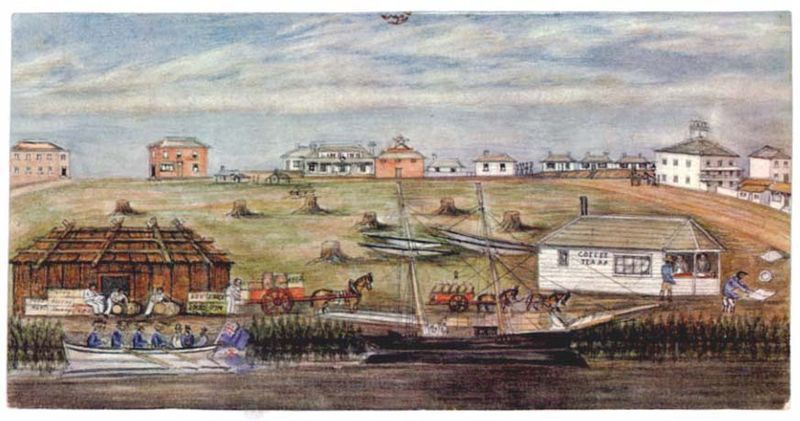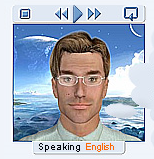Australia: The new continent: Melbourne, where Paco is travelling to, is a new city
In this topic, we will complete our knowledge of relative clauses. We will do further work on non-defining relative clauses and we'll focus on those relative clauses which, instead of modifying a concrete noun (antecedent), modify a whole clause. This which will help you improve your English a lot! Come on, let's begin!
 |
| By Eric A. Warbuton. Public domain |
Melbourne was founded in 1835 (47 years after the European settlement of Australia) by settlers from Van Diemen's Land (Tasmania). The early settlement was originally known as "Bearbrass". It was renamed "Melbourne" in 1837, in honour of William Lamb, who was the 2nd Viscount Melbourne. Melbourne was officially declared a city in 1847 by Queen Victoria, whose reign lasted 63 years and 7 months. In 1851, it became the capital city of the newly-created colony of Victoria. During the Victorian gold rush of the 1850s, it was transformed into one of the world's largest and wealthiest cities. After the federation of Australia in 1901, it then served as the interim seat of government of the newly-created nation of Australia until 1927.
Today, it is a centre for the arts, commerce, education, entertainment, sport and tourism. It is the birthplace of cultural institutions such as Australian film, Australian television, Australian rules football, the Australian impressionist art movement, which is known as the Heidelberg School, and Australian dance styles, including the Melbourne Shuffle and New Vogue. In recent years, it has also become a hub of the Australian music industry. For this, Melbourne is known as the "cultural capital of Australia".
Before the arrival of European settlers, the area was occupied for an estimated 31,000 to 40,000 years by under 20,000hunter-gatherers from three indigenous regional tribes: the Wurundjeri, Boonwurrung and Wathaurong. The area was an important meeting place for clans and territories of the Kulin nation alliance as well as a vital source of food and water. The first European settlement in Victoria was established in 1803 on Sullivan Bay, near present-day Sorrento, but this settlement was abandoned due to a perceived lack of resources. It would be 30 years before another settlement was attempted.
 |
| By Diliff. C. Commons |
In May and June 1835, the area that is now central and northern Melbourne was explored by John Batman, a leading member of the Tasmanian Port Phillip Association, who negotiated a transaction to buy 2,400 km2 of land from eight Wurundjeri elders. Batman selected a site on the northern bank of the Yarra River, declaring that "this will be the place for a village", and returned to Launceston in Tasmania, which was then known as Van Diemen's Land. However, by the time a settlement party from the Association arrived to establish the new village, a separate group led by John Pascoe Fawkner had already arrived aboard the Enterprize and established a settlement at the same location, on 30 August 1835. The two groups ultimately agreed to share the settlement. It is not known what Melbourne was called before the arrival of Europeans. Early European settlers mistranslated the words "Doutta-galla" which is believed to have been the name of a prominent tribal member, but said by some to also translate as "treeless plain". This was nevertheless used as one of the early names for the colony.
1 Adapted from Wikipedia.org
Read and listen to the text carefully. Then, answer the following questions:
1. According to the text, when was Melbourne considered one of the richest cities in the world?
2. What is the Heidelberg School?
3. According to the text, how did the group of settlers led by Fawkner get to where modern Melbourne is now located?
Remember to ask Mike any word, phrase or sentence you want her to pronounce for you. We're sure he has proved to be really helpful up to now. Come back whenever you need him
 |
| click here to ask Mike |
Are the relative clauses within the sentences non-defining?
1. Paco is travelling to Melbourne, which is the capital city of the state of Victoria.
Verdadero Falso
2. Melbourne exists due to the European settlers who travelled to Australia in the 18th century.
Verdadero Falso
3. The first settlement which was established in the area took place in 1803.
Verdadero Falso
4. Northern Melbourne was explored by John Batman, who was a leading member of the Tasmanian Port Phillip Association.
Verdadero Falso
Now that we know something about Melbourne and have remembered two important clues for recognising non-defining relative clauses, let's work on them in more depth.